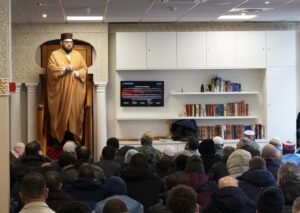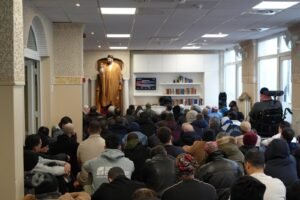Central Khutbah: “Reflecting on Allah’s Signs – One of the Greatest Acts of Worship” (Gallery + Video)
Reflection is a gift from Allah, a blessing He has bestowed upon us, but also a responsibility we carry. Those who do not reflect cannot progress – neither in faith nor in life. The early generations of Muslims considered reflection to be one of the most important acts of worship, a fundamental basis for truly knowing Allah and His blessings.
An example of this relationship with reflection is found in an event narrated by Aisha, may Allah be pleased with her:
Ibn Umair asked Aisha, may Allah be pleased with her:
“Tell us about the most wondrous thing you witnessed from the Messenger of Allah, peace and blessings be upon him.” She remained silent for a moment and then said:
“One night, he said to me: ‘O Aisha, allow me to worship my Lord tonight.’ I replied: ‘By Allah, I love being close to you, but I also love what makes you happy.’ He stood up, performed ablution, and began praying. He wept until his tears soaked his clothes, then he wept until his tears soaked his beard, and finally, he wept until the ground beneath him became wet. Bilal then came to inform him of the prayer time, and when he saw him crying, he asked: ‘O Messenger of Allah, why are you crying when Allah has forgiven your past and future sins?’ He replied: ‘Should I not be a grateful servant? Tonight, a verse was revealed to me: Indeed, in the creation of the heavens and the earth and the alternation of the night and the day are signs for those of understanding (Aal Imran, 190). Woe to those who recite it without reflecting upon its meaning.’”
(Takhrij Sahih Ibn Hibban, 620, authentic hadith according to Shu’ayb al-Arna’ut)
This incident illustrates how central reflection on Allah’s words and creation was to the worship of the Prophet, peace and blessings be upon him. Through this, he taught his companions – and us – that reflecting on Allah’s signs leads to gratitude and deeper knowledge.
The Hafiz Ibn Rajab, may Allah have mercy on him, said:
“The most frequent voluntary acts of worship of the Prophet, peace and blessings be upon him, and his companions were not in the abundance of fasting or prayer, but in the purity and goodness of their hearts, their strong connection to Allah, and their sincerity.”
(Lata’if al-Ma’arif, 254)
The early generations of Muslims considered reflection an essential part of their devotion. Their sayings and wisdom confirm this:
• “Reflection is the light of wisdom.” (Ibn al-Qayyim, Madarij as-Salikin)
• “One hour of reflection is better than a year of worship.” (Ibn Abbas, reported by Abu Nu’aym, Hilyat al-Awliya)
• “Whoever reflects on the creation of Allah increases their faith.” (Hasan al-Basri, reported by Ibn Abi Dunya, At-Tawakkul wa-l-I’tibar)
• “The best act of worship is reflection.” (Ibn Mas’ud, reported by At-Tabarani, Mu’jam al-Kabir)
• “Reflect on Allah’s blessings to be grateful to Him.” (Ibn Qayyim al-Jawziyya, Fawa’id)
Reflecting on Allah’s signs is the most beneficial. Do you reflect on Surah Al-Kahf when you recite it on Fridays? Here is an example of reflecting on part of a verse:
“Wealth and children are [but] adornment of the worldly life.”
Wealth makes worldly life easier, and children make it sweeter.
Reflect on the precision of the word used: “adornment” and not “value”!
A person’s value lies in their heart, not in their possessions.
In what they accomplish, not in what they control.
In the wealth of their soul, not in the treasures they own.
Do not be like those who envied Qarun for his wealth, until the earth swallowed him and his treasures. Only then did they realize the truth. Understand it in time!
Reflecting on Allah’s signs, whether from the Qur’an or His creation, is the most effective way to realize His greatness. So reflect, for you have been blessed with intellect!
(Central khutbah by the religious leader Hafiz Hilmija Redžić on January 17, 2025, at the “Association Islamique Le Juste Milieu” in Bonnevoie)

